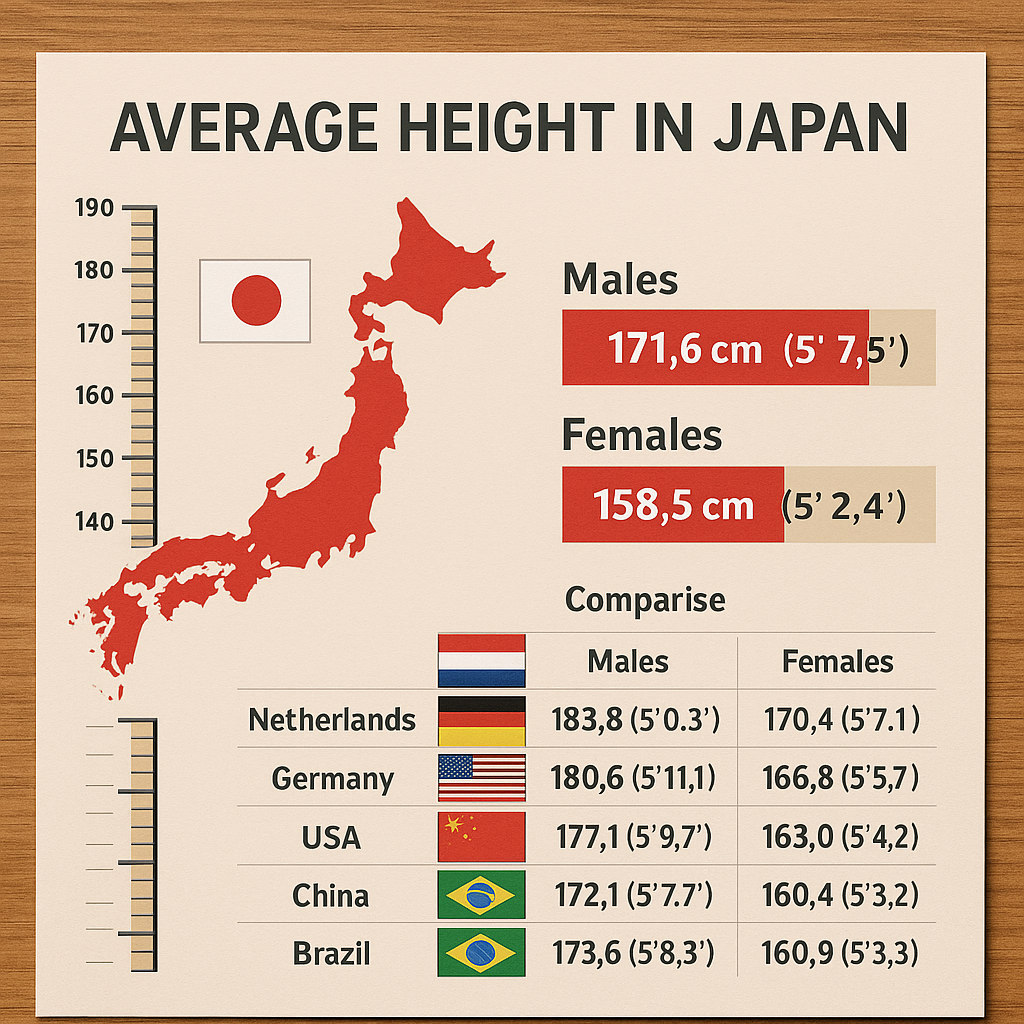
Understanding the average height in Japan provides valuable insights into health, nutrition, lifestyle, and even fashion and design trends in the country. In this guide, we’ll explore average heights by age and gender in Japan, and compare them with the average heights of people in 10 other countries.
What Is the Average Height in Japan?
The average height in Japan has increased steadily over the decades, reflecting improvements in diet, healthcare, and overall living standards.
- Japanese men: Approximately 171.6 cm (5 feet 7.5 inches)
- Japanese women: Approximately 158.5 cm (5 feet 2.4 inches)
These numbers are based on national health surveys conducted by Japan’s Ministry of Health, Labour and Welfare.
Average Height in Japan by Age Group
The table below shows the average height of Japanese males and females in centimeters and feet/inches by age range:
| Age Group | Males (cm / ft-in) | Females (cm / ft-in) |
|---|---|---|
| 5–9 years | 121.7 cm (4′ 0″) | 121.0 cm (3′ 11.6″) |
| 10–14 years | 154.3 cm (5′ 0.7″) | 152.4 cm (5′ 0″) |
| 15–19 years | 170.2 cm (5′ 7″) | 157.8 cm (5′ 2.1″) |
| 20–29 years | 172.1 cm (5′ 7.7″) | 158.9 cm (5′ 2.6″) |
| 30–39 years | 171.7 cm (5′ 7.6″) | 158.7 cm (5′ 2.5″) |
| 40–49 years | 171.1 cm (5′ 7.3″) | 158.2 cm (5′ 2.3″) |
| 50–59 years | 170.5 cm (5′ 7.1″) | 157.5 cm (5′ 2″) |
| 60–69 years | 168.2 cm (5′ 6.2″) | 155.6 cm (5′ 1.2″) |
| 70–79 years | 165.1 cm (5′ 5″) | 153.3 cm (5′ 0.3″) |
| 80+ years | 162.0 cm (5′ 3.8″) | 150.2 cm (4′ 11.1″) |
📊 Data sourced from Japan’s Ministry of Health, Labour and Welfare (2023 Survey).
Comparison with Average Heights in 10 Other Countries
To better understand Japan’s position globally, here’s a comparison of average adult male and female heights across 10 countries:
| Country | Male (cm / ft-in) | Female (cm / ft-in) |
|---|---|---|
| Netherlands | 183.8 cm (6′ 0.3″) | 170.4 cm (5′ 7.1″) |
| Germany | 180.6 cm (5′ 11.1″) | 166.8 cm (5′ 5.7″) |
| USA | 177.1 cm (5′ 9.7″) | 163.0 cm (5′ 4.2″) |
| UK | 177.5 cm (5′ 9.9″) | 164.4 cm (5′ 4.7″) |
| Canada | 178.1 cm (5′ 10.1″) | 164.8 cm (5′ 4.9″) |
| South Korea | 174.9 cm (5′ 8.9″) | 162.3 cm (5′ 3.9″) |
| China | 172.1 cm (5′ 7.7″) | 160.4 cm (5′ 3.2″) |
| Australia | 179.2 cm (5′ 10.5″) | 165.5 cm (5′ 5.2″) |
| Brazil | 173.6 cm (5′ 8.3″) | 160.9 cm (5′ 3.3″) |
| India | 166.5 cm (5′ 5.6″) | 153.2 cm (5′ 0.3″) |
| Japan | 171.6 cm (5′ 7.5″) | 158.5 cm (5′ 2.4″) |
🌐 Based on World Health Organization (WHO) data and national surveys.
Factors Affecting Height in Japan
1. Genetics
While genetics are the primary determinant of height, height gains in Japan over recent decades suggest environmental factors play a role too.
2. Nutrition
Post-WWII changes in Japanese diets—including more dairy, meat, and protein—have contributed to height increases.
3. Health and Healthcare Access
Japan’s high standard of healthcare supports proper child growth and development.
4. Urbanization and Living Conditions
Better living conditions, reduced physical labor, and improved public health infrastructure also influence average height.
How Japan’s Height Trends Compare Over Time
The average height of Japanese citizens has increased by about 10 cm since the 1950s. For example:
- 1950 average height (male): ~161 cm (5′ 3.4″)
- Today (male): ~171.6 cm (5′ 7.5″)
This reflects improved post-war nutrition, economic development, and better health awareness.
Why Does Average Height Matter?
✔️ Clothing and Fashion
Height data helps brands adjust sizing standards for better fit and comfort.
✔️ Architecture and Design
Interior designers, furniture makers, and even transport authorities consider average height in ergonomic design.
✔️ Public Health
Growth metrics are a strong indicator of child health and socioeconomic well-being.
Conclusion
The average height in Japan stands at about 171.6 cm (5′ 7.5″) for men and 158.5 cm (5′ 2.4″) for women, with slight variations across age groups. Compared globally, Japan ranks below Western countries like the Netherlands or the U.S., but above or comparable to many East and South Asian nations.



